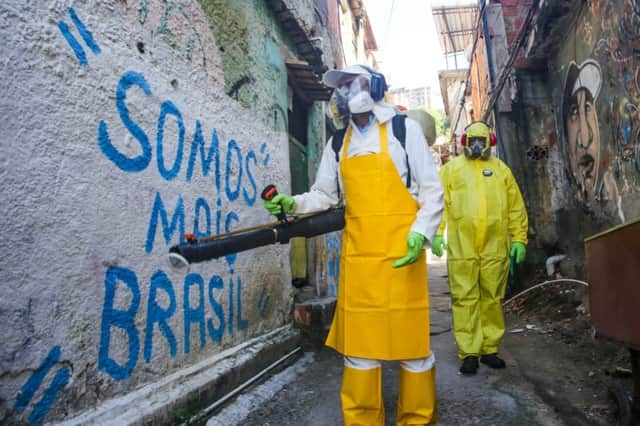The new Covid variant from Brazil may have been found in the UK - but is it more infectious?


Travellers from across South America have been banned from entering the UK amid growing concerns about a mutant coronavirus strain which has emerged in Brazil.
The ban which, also covers Portugal (due to its strong travel links with Brazil), the Central American state of Panama, and the former Portuguese colony of Cape Verde, came into force at 4am on Friday.
Advertisement
Hide AdAdvertisement
Hide AdBut what is the Brazil variant, and how worried should we be about the latest mutation of the virus?
Here is everything you need to know about it.
What is the Brazil variant?
Japan announced the detection of the new variant on 10 January and reported it to the World Health Organisation after the arrival from Brazil of a number of individuals infected with the strain.
Cambridge University microbiology professor Ravi Gupta said the Brazilian variant has three key mutations that “largely mirror” some of those in the hyper-infectious South African variant “hence the concern”.
The Government’s top scientist Sir Patrick Vallance confirmed the Brazilian variant contains “a change of the genetic code” that “changes a bit of a shape of the protein”.
Advertisement
Hide AdAdvertisement
Hide AdSir Patrick told ITV’s Peston programme that the changes that are being seen with the variants are “largely around increased transmission.”
“It makes it easier to get it from one person to another, it makes it easier therefore to catch,” he added.
Will vaccines work against the Brazilian variant?
At this stage, it’s too early to be 100 per cent sure what – if any – effect the Brazilian variant of the virus will have on vaccines going forward, but experts don’t appear to be too concerned just yet.
Dr Susan Hopkins, deputy director of the national infection service of Public Health England (PHE) said experts were looking at the new variant that has emerged in Brazil and needed to grow the virus in the UK in order to perform laboratory experiments.
Advertisement
Hide AdAdvertisement
Hide Ad“We need to understand the biology of these (new strains), as well as understanding mutations,” she told BBC Breakfast. “We will be watching them all to make sure that they can’t escape your immune response, which is the key thing that we’re looking at the moment.”
Even if this new variant is able to evade the current vaccines, Minister for Covid Vaccine Deployment Nadhim Zahawi has said new coronavirus jabs could be manufactured within just 30 to 40 days, and measures have been put in place to produce the “next iteration” of jabs if needed.
Zahawi told MPs: “We want to be able to rapidly… produce the next iteration, manufacture it, and be ready for if the vaccine does mutate to a level where we do need the next iteration of a vaccine.”
“We have to be ready for that what if question: what if there is a variant that the vaccines don’t work as well on? We’ve invested, not just in infrastructure, but in thinking through how we would do that.”
Does it make the virus any worse?


Advertisement
Hide AdAdvertisement
Hide AdAgain, it's early days yet, but when asked about the variant, Sir Patrick told Peston that there is no evidence new variants are more deadly.
He explained: “There’s no evidence at all with any of these variants that it makes the disease itself more severe.”
Safeguarding Minister Victoria Atkins said the UK was monitoring the new Brazilian coronavirus variant “very carefully” and that “practical measures” were being worked on.
Speaking on Sky News, she added: “This variant has been spotted and it is not unusual for viruses to develop variations in their strains.
Advertisement
Hide AdAdvertisement
Hide Ad“But in terms of the UK, we are monitoring it very, very carefully, we have a world-leading team of scientists working on the different forms of the virus.
Is it in the UK?
Professor Wendy Barclay, head of G2P-UK National Virology Consortium, a new project set up to study the effects of emerging coronavirus mutations, said one Brazilian variant of coronavirus has been detected in the UK.
She said: “There are two different types of Brazilian variants and one of them has been detected and one of them has not.”
She added that variant was probably introduced to the UK “some time ago”, but said its spread would be being traced “very carefully”.
Advertisement
Hide AdAdvertisement
Hide AdHowever, other experts have disputed this claim. Professor Andrew Hayward, director of the University College London (UCL) Institute of Epidemiology and Health Care and a member of the Scientific Advisory Group for Emergencies (Sage), told Times Radio he was not aware of the new Brazilian variant being in the UK but “I wouldn’t take that as gospel.”
And asked if the Brazilian mutant of coronavirus was in the UK, Transport Secretary Grant Shapps told BBC Radio 4’s Today programme: “Not as far as we are aware, I think, at this stage. There haven’t been any flights that I can see from the last week from Brazil, for example.”
How common are virus mutations?
Recent weeks have seen multiple reports of new variants of coronavirus emerge from around the world.
This is not unexpected, as all viruses naturally mutate as they spread through a population. It's thought that the Sars-CoV-2 coronavirus has undergone one or two changes a month since the start of the pandemic.
Advertisement
Hide AdAdvertisement
Hide AdThis is actually a fairly slow pace compared to other viruses like seasonal flu, which mutate at such a rate that new vaccines must be introduced every year.
Mutations usually happen by chance, and don’t have much impact on the properties of a virus - the World Health Organisation (WHO) said these changes are “natural and expected”.
Often, they can lead to a weaker version of the virus, or the changes could be so small that there’s no difference in its behaviour.
However, sometimes viruses can mutate in a way that helps the infection to spread, as has been seen with the so-called UK variant that has emerged in recent months.
A version of this article originally appeared on our sister title, the Scotsman